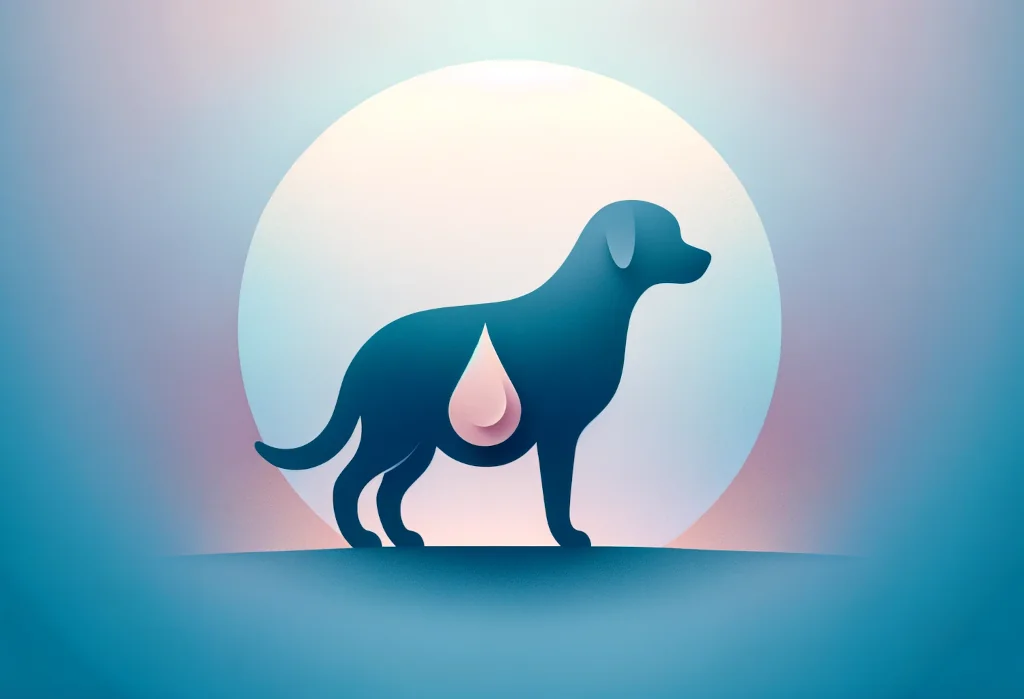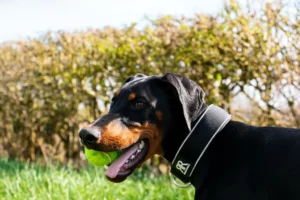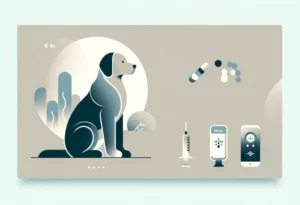When your furry friend leaves little “surprises” around the house, it’s not their way of redecorating. It’s a cry for help, or maybe just a leaky faucet.
Dealing with a dog that’s suddenly turned your home into their personal restroom can be as frustrating as trying to catch a squirrel on a sugar high. But here’s the scoop: This blog post will arm you with the knowledge and strategies to tackle your dog’s urinary incontinence head-on.

Quick Takeaways:
- Urinary incontinence in dogs often signals health issues; early vet consultation is key for diagnosis and treatment.
- Simple home adjustments and dietary changes can significantly improve your dog’s comfort and manage incontinence.
- Explore both medical interventions and natural remedies under vet guidance to tailor a comprehensive management plan.
What’s Behind My Dog’s Urinary Accidents?
Discovering a puddle where there shouldn’t be one can frustrate any pet parent. But before you think this is a case of bad behavior, let’s dig a bit deeper. Often, urinary incontinence in dogs is a red flag for underlying health issues – not a spiteful act. Here are the common culprits:
- Urinary Tract Infections (UTIs): Just like in humans, a UTI can make holding urine a real struggle for your furry friend.
- Age-Related Muscle Weakness: Senior dogs sometimes lose muscle tone in the bladder sphincter, leading to unexpected leaks.
- Hormonal Imbalances: Particularly in spayed females, imbalances can weaken the bladder’s control mechanisms.
Understanding that your dog’s accidents are likely not intentional is the first step towards addressing the issue with compassion and proper care.
Can Diet and Lifestyle Impact My Dog’s Bladder Health?
Absolutely! The road to a healthy bladder starts at the food bowl and doesn’t end until after the daily walk.
Diet: Foods rich in antioxidants and omega-3 fatty acids can boost overall health, including bladder function. Supplements like glucosamine and chondroitin also support the urinary tract. One example to consider is fish-based diets, or adding fish oil supplements to your dog’s meals.
Hydration: Encourage regular water intake. Fresh, clean water should always be available. Sometimes, adding water to dry food or serving wet food can help meet hydration needs.
Exercise: Regular, moderate exercise helps maintain a healthy weight, reducing the pressure on the bladder and keeping the body systems, including the urinary tract, functioning properly.
Little tweaks in your dog’s diet and routine can pay off big time when it comes to bladder health.
Are There Medical Solutions to Urinary Incontinence?
When lifestyle changes don’t cut it, veterinary intervention can make a huge difference. Here’s what might be on the table:
-
Medications: Drugs like phenylpropanolamine (PPA) tighten the bladder sphincter muscles, making leaks less likely.
-
Hormone Therapy: Especially for spayed females facing hormonal imbalances, estrogen supplements can sometimes restore bladder control.
-
Surgery: For severe or anatomically based incontinencies, surgical options exist. These range from procedures that adjust the position of the bladder to implants that improve sphincter control.
One unique angle not often discussed is the role of acupuncture in managing incontinence in dogs. Acupuncture, when used alongside traditional treatments, has shown promising results in improving bladder control by strengthening the neural pathways involved in bladder function. Though it might sound unconventional, it’s a testament to the variety of tools at your disposal when tackling incontinence.
Every dog’s situation is unique, requiring a tailored approach to treatment. Partnering with your vet will help identify the most effective strategy for managing your dog’s urinary incontinence, ensuring they can lead a happy, comfortable life.
How Can I Make My Home More Comfortable for My Incontinent Dog?
Living with an incontinent dog certainly presents its set of challenges, but it also opens the door to a unique set of solutions that can make life easier and more comfortable for your furry friend. Remember, it’s all about creating an environment that’s forgiving, clean, and yet still feels like home sweet home for both of you.
1. Investing in Doggie Diapers:
Doggie diapers aren’t just a temporary fix; they can be a godsend for managing urinary incontinence effectively. They come in washable and disposable varieties, ensuring that you can choose what works best for your lifestyle and your dog’s comfort. Just be sure to change them regularly to prevent any nasty infections.
2. Waterproofing Their World:
Consider laying out waterproof or water-resistant covers over your dog’s bedding, couches, or any favorite lounging spot. Materials like washable pee pads or even baby crib mattress covers work well and are easy to clean.
3. Easy-Clean Floors and Rugs:
Rugs are cozy, but they’re a pain to clean. Opt for throw rugs that can be easily tossed in the wash or mats that can be wiped down. In areas your dog frequents, you might want to use interlocking waterproof floor mats, the kind used in children’s play areas—they’re surprisingly stylish these days and super easy to maintain.
4. Regular Grooming:
This one’s a bit unique but crucial. Keeping the fur around your dog’s genitals trimmed can reduce the chance of infections and makes cleanup much easier. It’s a small step that’s often overlooked, but it can make a big difference in their comfort and hygiene.
Remember, adapting your home for an incontinent dog is about anticipating messes before they happen and making clean-ups as stress-free as possible. With a bit of preparation, both of you can relax and enjoy your time together, worry-free.
Natural Remedies: Do They Work?
When it comes to managing urinary incontinence in dogs, the internet is a treasure trove of natural remedies. But before you dive headfirst into holistic treatments, it’s critical to separate the wheat from the chaff. Let’s take a closer look at what works, what doesn’t, and what deserves a cautious approach.
Corn Silk:
Believe it or not, corn silk–yes, those silky threads atop your corn on the cob–has shown promise in managing canine urinary incontinence. It acts as a mild diuretic and urinary soother. However, always consult with your vet before introducing it to your dog’s regimen, as it might interact with other medications.
Pumpkin Seeds:
Raw, unsalted pumpkin seeds are another popular remedy touted for urinary health. They’re rich in antioxidants and fatty acids, known for supporting urinary tract health. Anecdotally, they’ve been used to help tighten up those leaky faucets, but scientific evidence remains thin on the ground. Again, vet approval is crucial.
Cantharis and Staphysagria:
Homeopathic remedies such as Cantharis and Staphysagria are often recommended for their supposed benefits in treating urinary issues. While some dog owners report positive outcomes, these treatments lack robust scientific backing. Always approach with caution and seek professional guidance.
Acupuncture:
Here’s an interesting one – acupuncture. It’s receiving increasing attention for its potential benefits in managing canine urinary incontinence, especially when traditional treatments have fallen short. A trained vet in veterinary acupuncture could provide a safe and potentially effective treatment option.
When exploring natural remedies, the golden rule is clear: consultation with your vet is key. Not every “natural” solution is safe, and what works for one dog might not work for another. Your vet can help you navigate these waters safely, ensuring any treatment, natural or otherwise, is in your dog’s best interest.
In the end, managing urinary incontinence in dogs, whether through home modifications or natural remedies, is about enhancing your dog’s quality of life and keeping them comfortable. Remember, your vet is your ally in this journey, and together, you can find the best path forward for your furry friend.
Alex, a passionate animal lover, has experience in training and understanding animal behavior. As a proud pet parent to two dogs and three cats, he founded AnimalReport.net to share insights from animal experts and expand his knowledge of the animal kingdom.




